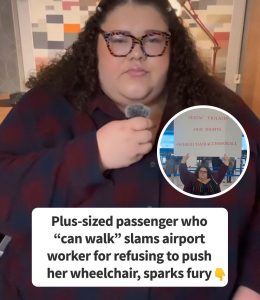Travel influencer Jaelynn Chaney is speaking out against what she calls blatant discrimination at Seattle-Tacoma International Airport (SeaTac) after an incident in May 2024 that left her feeling humiliated and abandoned. At 28 years old, Chaney, who has garnered a following of over 140,000 on TikTok, shared a powerful video online and staged a peaceful protest inside the airport holding a sign that read “Wheelchair Access for All.” Her message: no one should be denied assistance because of their body size.

According to Chaney, the issue began when she requested wheelchair assistance upon landing at SeaTac, something she typically does due to mobility challenges over long distances. Although she is able to walk short stretches, extended distances in airports, especially when oxygen isn’t used, can be physically taxing for her. She expected the usual help, but what happened next shocked her. As she tells it, the airport staff member assigned to assist her took one look at her, reacted negatively, and walked away without offering support. “She saw me, made a face, and walked away,” Chaney recalled in her video. “All the other passengers received the help they needed, but I was left behind.”
This moment wasn’t just emotionally painful for Chaney—it also became a serious health concern. She explained that she had to walk one of the longest jet bridges she’d ever encountered, entirely on her own. By the time she finally reached a waiting wheelchair, her lips had turned white, her oxygen levels had dipped, and she felt close to passing out. “This was my first time flying without oxygen,” she said. “That employee made assumptions about my physical capability and chose not to help. That’s not just poor service—it’s dangerous and discriminatory.”
In her social media post, Chaney didn’t hold back. She described SeaTac as part of a broader problem in how larger-bodied travelers are treated, especially when they’re also disabled. “If SeaTac refuses to assist fat people, they should put their discrimination in writing,” she wrote. “Instead, they lie, deny services, and leave disabled fat travelers stranded.” Her caption made it clear that she doesn’t intend to let the matter go unnoticed. “This is unacceptable,” she added. “I will not stay silent.”
@goodmorningbritain Plus-sized travel campaigner Jae’lynn Chaney is calling on airlines to allow bigger passengers an extra seat, free of charge. #Planeseats #Travel #plusize ♬ original sound – GoodMorningBritain
This isn’t the first time Chaney has publicly addressed the challenges that plus-size travelers face. She has long been a vocal advocate for equal treatment and accessibility, and the SeaTac incident has only added more urgency to her campaign. In 2023, she launched a petition demanding the Federal Aviation Administration (FAA) enforce a “customer of size” policy that would apply to all U.S. airlines. Her proposal called for several changes, including free extra seating for larger passengers, improved seating accessibility, and mandatory sensitivity and inclusion training for airline staff.
That petition has since collected over 39,600 signatures, drawing widespread support from people who have experienced similar discomfort or mistreatment during air travel. Many of the signatories have shared deeply personal stories in the petition’s comments section, describing everything from bruised knees due to tight seating to full-blown fat-shaming from fellow passengers. One supporter wrote, “After being fat-shamed by the person sitting next to me, I no longer fly.” Another shared, “I’m tall, and I still leave every flight bruised. Airlines are shrinking seat sizes more and more, and expecting us to just deal with it.”
For Chaney, the SeaTac incident is just one example of a much larger issue in the travel industry. She believes that the way plus-size passengers are treated is not just an inconvenience—it’s a violation of basic human dignity. “Plus-size passengers face pain, humiliation, and sometimes outright denial of service,” she said. “That’s not just uncomfortable, it’s discriminatory. We deserve better.”
Her efforts are part of a growing movement to challenge outdated norms and demand accessibility and fairness in public transportation. While some critics argue that accommodating larger bodies presents logistical or financial hurdles, Chaney and her supporters maintain that inclusivity is a matter of civil rights. “Nobody should be made to feel ashamed or unsafe when trying to get from point A to point B,” she explained. “Traveling should be accessible to everyone, regardless of size.”
As her protest video continues to gain views and support online, Chaney remains committed to pushing for change. She says she wants to work directly with airport administrators and airline representatives to develop better policies and training practices that address the real needs of travelers like her. Her goal is not just to call out the problem, but to be part of a solution that ensures all people—regardless of size, ability, or background—are treated with respect and care.
Chaney’s story has ignited a fresh wave of conversation about the travel industry’s standards and how they disproportionately affect people who don’t fit into what society has long considered “normal” body types. It’s also reignited questions about who gets to define accessibility and comfort in spaces that are supposed to serve the general public. For her part, Chaney insists that being fat and disabled should never mean being left behind—especially not in places like airports, which are required by law to accommodate all travelers.
As more travelers begin to share their own stories and amplify Chaney’s call to action, it becomes increasingly clear that these aren’t isolated events, but part of a systemic issue that needs urgent attention. Whether it’s fighting for extra space, accessible equipment, or simply being treated with dignity, Chaney’s message is resonating with people far beyond her TikTok following.
She’s not just protesting for herself—she’s standing up for every traveler who’s ever felt ignored, disrespected, or dismissed. And as she continues to speak out, it’s clear she’s not going anywhere quietly. Her voice is strong, her message is clear, and her determination is inspiring a movement rooted in compassion, equality, and real change.





